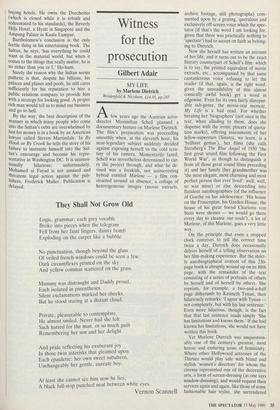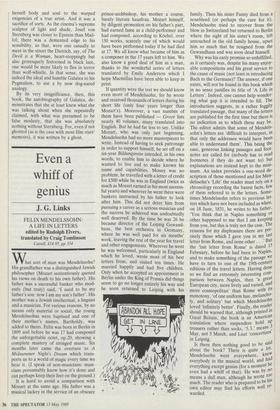Witness for the prosecution
Gilbert Adair
MY LIFE
by Marlene Dietrich
Weidenfeld & Nicolson, £14.95, pp.243
Afew years ago the Austrian actor- director Maximilian Schell planned a documentary feature on Marlene Dietrich. The film's preparation was proceeding smoothly when, at the eleventh hour, his near-legendary subject suddenly decided against exposing herself to the cold scru- tiny of his camera. Momentarily fazed, Schell was nevertheless determined to car- ry the project through, and what he de- vised was a freakish, not uninteresting hybrid entitled Marlene — a film con- structed around an absence, a collage of heterogeneous images (movie extracts, archive footage, still photographs) com- mented upon by a grating, querulous and exclusively off-screen voice which the spec- tator (if that's the word I am looking for, given that there was practically nothing to `spectate') had to accept on faith as belong- ing to Dietrich.
Now she herself has written an account of her life, and it turns out to be the exact literary counterpart of Schell's film: which is to say, the printed equivalent of movie extracts, etc. , accompanied by that same cantankerous voice refusing to let the reader (if that, again, is the right word, given the unreadability of this almost comically awful book) get a word in edgewise. Even for its own fairly disreput- able sub-genre, the movie-star memoir, My Life is a bad read. For whether berating her 'biographers' (not once in the text, when alluding to them, does she dispense with the ironic pincers of quota- tion marks), offering assessments of her fellow-superstars (Sinatra, we learn, is a `brilliant genius'), her films (she calls Sternberg's The Blue Angel of 1930 'the first great sound film following the First World War', as though to distinguish it from all those great sound films preceding it) and her family (her grandmother was `the most elegant, most charming and most perfect person that ever lived': well, well, so was mine) or else descending into flatulent autobiographies (of the influence of Goethe on her adolescence: 'His house on the Frauenplan, his Garden House, the house of his great friend Charlotte von Stein were shrines — we would go there every day to cleanse our souls'), a lot of Marlene, of this Marlene, goes a very little way.
On the principle that even a stopped clock contrives to tell the correct time twice a day, Dietrich does occasionally deliver herself of a telling observation on her film-making experience. But the strict- ly autobiographical content of this 230- page book is abruptly wound up on its 88th page, with the remainder of the text consisting of a series of portraits of others by herself and of herself by others. She reprints, for example, a two-and-a-half page dithyramb by Kenneth Tynan, then hilariously remarks: 'I agree with Tynan not completely, but with his last sentence.' Even more hilarious, though, is the fact that that last sentence reads simply 'She has limitations and knows them.' If she had known her limitations, she would not have written this book.
Yet Marlene Dietrich was unquestion- ably one of the century's greatest, most heroic and enduring icons of femininity. Where other Hollywood actresses of the Thirties would play safe with bland and stylish `women's directors' for whom the cinema represented one of the decorative arts, a form of screen-dressing (as one says window-dressing), and would request their services again and again, like those of some fashionable hair stylist, she surrendered herself body and soul to the warped exigencies of a true artist. And it was a sacrifice of sorts. As the cinema's supreme sculptor of light and shade, Josef von Sternberg was closer to Epstein than Mail- lol; there was a demented edge to his sensibility, so that, were one casually to meet in the street the Dietrich, say, of The Devil is a Woman, heart-stoppingly but also grotesquely festooned in black lace, one would be more likely to flee in terror than wolf-whistle. In that sense, she was indeed the ideal and humble Galatea to his Pygmalion, to use a by now dog-eared analogy.
By its very insignificance, then, this book, the autobiography of Galatea, de- monstrates that she at least knew what she was talking about when she repeatedly claimed, with what was presumed to be false modesty, that she was absolutely nothing without Sternberg. For, even if not ghosted (as is the case with most film stars' memoirs), it was written by a ghost.



























































 Previous page
Previous page